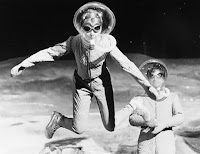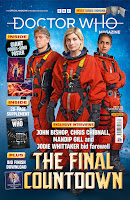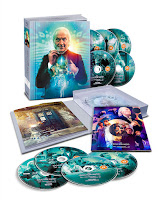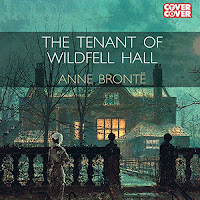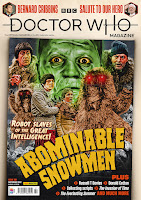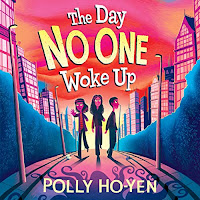Thursday, February 23, 2023
Radio Free Skaro #893
Wednesday, February 22, 2023
Vworp Vworp! #5
Waiting for me at home was issue 5 of the excellent fanzine Vworp Vworp!, which includes my short piece, "Dalek December" on the 1965-66 stage play The Curse of the Daleks written by David Whitaker and Terry Nation, the focus being on whether it was any good. There are lots of other Whitaker-related goodies, not by me - and I gasped at the colourised photo.
I've now got to get back to writing my forthcoming biography of Whitaker, and a bunch of other stuff. Tomorrow I'm interviewing Eli Lee and Aamina Ahmad, the last two winners of the Writers' Guild of Great Britain's Best First Novel award. It's a free event, you just need to sign up.
Monday, February 13, 2023
The Morbid Age, by Richard Overy
"Ideas do not operate in a social vacuum. Much of what follows explores the many ways in which ideas were communicated and how extensively, socially and geographically. The discourse did not remain the preserve of an isolated cultural elite but flourished in the first real age of mass communication." (p. 5)
He lists the uptake of radio licenses, the sales of cheap paperbacks, the wide variety of lectures and summer schools, even the instructional films on frank subjects (ie sex).
"British society had a thirst for knowledge and a mania for voluntary associations willing to supply it. The state played a part in this process by developing more sophisticated statistical measurement and applying this to areas of policy or by identifying areas of key public concern which the government could review. The government enquiries on the trade in arms, on sterilisation policy, mental defect, population development and the depressed areas supplied ammunition for the public debates on social degeneration, economic crisis and war." (p. 375)
Historical incidents are used to show how people took or shifted positions. There's nothing on the "Spanish" flu and little on the Wall Street Crash, presumably because they didn't challenge people's previously held views. But there's lots on how the Spanish Civil War challenged the large and well-organised pacifist cause. For example, Overy quotes Julian Bell, nephew of Virginia Woolf, in a letter from 1937 to EM Forster as Bell made his way to fight - and die - in Spain:
"At this moment, to be anti-war means to submit to fascism [and] to be anti-fascist means to be prepared for war." (p. 339, in a section quoting from PN Furbank's EM Forster: A Life (London, 1977), pp. 223-4, and Mepham's Virginia Woolf, pp. 168-9.)
Overy details the impact that this and Bell's death had on this literary circle, many of whom initially held to their prior anti-war convictions. This then dovetails with the Prime Minister's efforts to avoid conflict with Hitler, and the gradual shift in public attitudes in the lead up to the Second World War.
"The most remarkable convert was the pacifist philosopher Cyril Joad, whose absolute renunciation of war was reiterated publicly right up to its outbreak and beyond. After wrestling with his convictions for some months in 1940 he experienced a dramatic change of heart. Writing in the Evening Standard in August 1940 under the headline 'I Was a Life-long Pacifist, but Hitler Changed my Mind', Joad explained that the things he valued about England - 'the free mind and the compassionate heart, the love of truth ... of respect for human personality' - were absolutely endangered by a Hitler victory which would usher in a Dark Age." (p. 352)
[Note to self: this is, broadly, the same kind of shift embodied in Alydon the Thal in the first Doctor Who story to feature the Daleks.]
What really struck me is the fatalism in all this: the widespread sense that while it might have been necessary to go to war with Hitler, such conflict would more likely end than save civilisation. That sentiment, I think, haunts The Lord of the Rings (I've been listened to the BBC radio version recently, more of which anon). It adds something to what I've been told about my grandparents' hastily arranged weddings (in September 1939 and 1940 respectively). It permeates into the book I'm writing now on David Whitaker, and his fatalistic view that history cannot be changed and we are simply swept along in its course. Yes, an idea to shift the ground beneath me.
Overy opens the book with the recollection of a telling conversation with the historian Eric Hobsbawm in which,
"he told me that he could remember a day in Cambridge in early 1939 when he and some friends discussed their sudden realization that very soon they might all of them be dead. This did strike me as surprising, and it runs against the drift of the [Hobsbawm] memoirs, in which he argued that communists were less infected by pessimism than everyone else because of their own confidence in the future." (p. xiii)
Even the faithful shared - if just on one day - that sense of foreboding. But then they were swept on.
Sunday, February 05, 2023
The Life of Crime, by Martin Edwards
"After leaving England, Highsmith moved to continental Europe, but crossing international borders with her pets presented a serious challenge. She rose to it, as she explained to her American editor, by smuggling her snails in her bra, six to ten a breast, he reported: 'That just wasn't on the one trip - no, she kept going back and forth ... And she wasn't joking - she was very serious.'" (p. 411, editor Larry Ashmead quoted from Andrew Wilson's biography, Beautiful Shadow: A Life of Patricia Highsmith (2009))
Or there's the six well-known crime writers - Anthony Berkeley, Dorothy L Sayers, Agatha Christie, Hugh Walpole, EC Bentley and Father Ronald Knox - who wrote an episode each of Behind the Screen for BBC Radio in 1930, the audience at home challenged to solve the mystery as it unfolded over six instalments, aided by each episode also being published in The Listener the same week as broadcast. However, Walpole, responsible for writing and reading the first episode, wanted to be spontaneous and insisted on reading from notes.
"So Hilda Matheson, in charge of the [BBC] Talks Department, arranged for two parliamentary reporters to take down his words [during the Saturday-evening broadcast], and type them up on the Sunday morning, so that she or [producer Howard] Marshall could check the transcript that afternoon, and post the corrected version to the printers so that they had it at half past seven on Monday morning. Even then, publication of The Listener was delayed." (p. 260)
Hooray for Hansard, and for quick, efficient postal service even on a Sunday night!
Then there's Val Gielgud, BBC director and brother of John, whose,
"exotic lifestyle - he married five times, and often wore a cloak and carried a sword-cane - was certainly a gift for the gossip columnists." (p. 261)
What an image! This was in the 1930s; Edwards is talking about Gielgud's radio version of Rope and his collaboration, with BBC colleague Eric Maschwitz, on Death at Broadcasting House (1934). But it conjured in my head a vision more like the '60s, all Avengers and Adam Adamant. And that's what this book is so often about - writers and contributors who pushed the genre forward, who were ahead of their time.
The serious and thorough history is peppered with this odd, enthralling stuff, but Edwards also has a wry line in humour, such as describing the premiere at Carnegie Hall on 10 April 1927 of Ballet Mecanique by George Antheil.
"Unfortunately, everything that could go wrong on the night did go wrong. There weren't even any riots." (p. 200)
His enthusiasm is also infectious, such as his wholly understandable awe in describing the novel The Living and the Dead (1994) by Awasaka Tsumao, a pseudonym of illusionist Masao Atsukawa. The book was published with its signatures uncut so that only 24 of the 215 pages could initially be read - basically every eighth verso and recto, if I've got my sums right. The title page then gives instructions on,
"HOW TO READ THIS BOOK: First of all, please read the book with the sealed binding. You'll read a short story. Next, cut each page and enjoy a full-length novel. The short story has disappeared. (signed) The Author. The Disappearing Short Story." (pp. 541-2)
Edwards tells us that,
"The short story involves a small group of people at a bar, one of whom is a sad young man who seems to have psychic abilities. But when the pages are cut, that character disappears. There's at least one gender switch, the setting becomes a magic club rather than a bar, and Yogi Gandhi (who doesn't appear in the short story) is the hero. The magic only works because of the nature of the Japanese language. It would be impossible to translate while maintaining the effect. It also can only work in a print version." (p. 542, and based on the author's discussions with Steve Steinbock)
Like Edwards, I'm now haunted by this outrageously ingenious artefact, and keep turning over how it might be restaged in English. A book to haunt a writer's dreams.
All in all, it's a fascinating and detailed history, and also a rich source of inspiration. It covers an enormous range of material and themes. If I'm being nitpicky and selfish, I'd have liked more on the overlaps between the detective story and science-fiction, if only because that's continually churning through my head - see my thread on science-fiction and Sherlock Holmes. Edwards makes four references to Isaac Asimov, whose The Caves of Steel (1954) features a robot detective, but three of these references are in end notes, only one in the main body of text. Really, I just want him to recommend me more in that vein.
And then there's the devastating statement on the fundamental paradox of genre, taken from Janwillem van de Wetering's Robert van Gulik: His Life His Work (1987)...
"The true artist yearns to grow and move forward. The general public has an insatiable appetite for more of the same." (p. 500)
More:
- My Sherlock Holmes novel, The Great War
- My locked-room Doctor Who stories Home Truths and, er, The Locked Room
Thursday, February 02, 2023
Doctor Who Magazine #587
Friday, January 27, 2023
Body Parts - Essays on Life-Writing, by Hermione Lee
How brilliant, for example, to note Angela Thirkell's "blithe lack of sexual awareness" by quoting from a scene in The Brandons (1939) in which characters at a village fete take a ride on a merry-go-round made of wooden animals:
"'I knew it was you on the ostrich,' she [Lydia] said to Delia ... 'I say, someone's on my cock.'
'It's only my cousin Hilary,' said Delia. 'He won't mind changing, will you, Hilary...'
Mr Grant, really quite glad of an excuse to dismount, offered his cock to Lydia, who immediately flung a leg over it, explaining that she had put on a frock with pleats on purpose, as she always felt sick if she rode sideways...
... 'I know that once Lydia is on her cock nothing will get her off. I came here last year ... and she had thirteen rides." (Lee, p. 180, quoting Thirkell pp. 260-2)
This is all the more extraordinary when Lee then tells us that Thirkell was the mother of Colin Macinnes, author of Absolute Beginners (1959) and other bold works exploring sexuality and decadence. As a result, the quoted passage becomes something else, indicative of the clash between mother and son.
Lee quotes juicy bits from a number of other biographies, and like her I'm drawn to what she calls the "brutal, funny and helpful" advice given by the writer Colette to actress Marguerite Moreno:
"You lose most of your expressiveness when you write... Stick in a description of the decor, the guests, even the food... And try, oh my darling, to conceal from us that it bores the shit out of you to write." (Lee, p. 117, quoting Judith Thurman's Secrets of the Flesh - A life of Collete (1999), p. 543)
Or there's the way she explains the shock that met Ellen Glasgow in the 1930s writing stories about degeneration, extramarital love and scientific arguments against religion etc, then quotes one of Glasgow's characters - "failed philosopher, John Fincastle" - to get a sense of the impact on the author's own career.
"Nobody could earn a livelihood in America by thinking the wrong thoughts." (Lee, p. 124, quoting Glasgow's Vein of Iron (1935), p. 38)
Body Parts is peppered with this stuff. Even the briefest reference to Jane Porter's 1803 novel Thaddeus of Warsaw (p. 125) ignited my interest, prompting additional reading and connections - and perhaps a new project to lose myself in...
But what about things I'm writing now? Two essays in this collection, "Virginia Woolf's nose" at the start and "How to End It All" at the conclusion, address the ways that accounts of a person's death are often written to cast light or reflection on the life as a whole. Imagining the subject looking back over their lives is a a conceit, imposing neatness on what can be untidy ends. In fact it's not just death: lives are often untidy and inconsistent, and Lee is good on exploring that - how to address contradictory or outlier evidence, or the way a theory about someone's life can be repeated by biographers until it takes on the authority of "fact". Lee says,
"this process of cumulative reiteration happens all the time" (p. 135)
I'm mindful of that as I write my biography of David Whitaker - and also my book on his 1964 Doctor Who story, The Edge of Destruction, where I can see such reiteration in the "facts" about early Doctor Who. I'm not sure Lee provides answers to the knotty questions that she raises about how we go about telling a story without fictionalising real life - but I think that's the point. There is plenty to think about; she directs us towards the things to worry at.
Saturday, January 21, 2023
The Distant Echo, by Val McDermid
Wednesday, January 18, 2023
The Return of Faraz Ali, by Aamina Ahmed
A police officer is sent to Lahore to cover up the murder of a young girl, and in doing so stirs up all kinds of history — some personal, some family, some national... We were spellbound by this haunting, tragic and beautifully told story.
Also shortlisted for the award were Braver by Deborah Jenkins -
Hazel, suffering from anxiety and OCD, forms an unlikely friendship with Harry, a troubled teen, and Virginia — a church minister facing a crisis. This warm, funny novel is also inspiring and very moving. A delight to read.
- and An Olive Grove in Ends by Moses McKenzie:
Sayon dreams of escaping the “Ends” in Bristol and living in the big house his Mum once pointed out to him — but achieving his dream won’t be easy as he’s just killed someone. A gripping, richly told thriller full of life and character.
And there were lots and lots of very good novels which sadly didn't make the shortlist. Thanks to everyone who submitted novels to the award, and thanks to my amazing fellow judges (Martin Day, Tim Glencross, Merle Nygate, Qaisra Shahraz and Ceriann Taylor) for their hard graft in reading so many books in such a short space of time last year.
Friday, January 13, 2023
David Whitaker in an Exciting Adventure with Television
David Whitaker in an Exciting Adventure with Television will be out in the second half of 2023. More details - a great wealth of more detail - to follow.
The book couldn't have happened without director Chris Chapman employing me as consultant and talking head on the documentary Looking for David, recently released on the Blu-ray collection of Doctor Who's second year of adventures.
I'm also grateful to the team at the official Doctor Who Magazine who've published some of my research into Whitaker and his world. And it all sprang from the research I did for my Black Archive book on The Evil of the Daleks, a 1967 Doctor Who story written by David Whitaker. My book on his 1964 story The Edge of Destruction for the same range will also be out later this year.
Thursday, January 05, 2023
Doctor Who Magazine #586
"Remarkable ... meticulously researched and ultimately poignant."
There's more praise for the documentary in Richard Unwin's review of the Doctor Who: The Collection - Season 2 (the Blu-ray box-set it's part of).
"... nothing short of extraordinary [with] jaw-dropping revelations provided by biographer Simon Guerrier".
So that's nice.
Elsewhere in the magazine, I lavish praise on the new edition of Doctor Who and the Daleks (the first ever Doctor Who novelisation, first published in 1964) which boasts 58 illustrations by Robert Hack and is a delight. I also slip in a couple of new facts about author David Whitaker, too.
Plus, in "No Time to Die", Rhys Williams and I dig into the sets and production of missing 1965 episode The Traitors, with the sets recreated in CGI by Rhys with Gavin Rymill and Anthony Lamb. By chance, yesterday I realised that two elements of The Traitors may originate in something also written by Whitaker - but more on that in due course...
Wednesday, January 04, 2023
Adventures in the Screen Trade, by William Goldman
Saturday, December 24, 2022
Cinema Limbo: Give My Regards to Broad Street
Monday, December 19, 2022
Blake's 7: No Name preview
At 39:25 there are interviews with producer Peter Anghelides, me and actor Brian Croucher about the story. Then, at 1:09:53 you can hear the first 15 minutes of No Name. It's the first I've heard of the episode, and I'm thrilled.
No Name will be released later this month as part of the Allies and Enemies set, alongside stories by Lizbeth Myles and Jonathan Morris.
Blake's 7: No Name by Simon Guerrier
Everyone on Vanstone is hiding something. That’s why they are there. Hiding from her own past, Arlen wonders what has brought Roj Blake to this remote outpost.
Has Arlen uncovered a buried secret? And what does Space Commander Travis want on Vanstone?
Cast:
Sasha Mitchell (Arlen); Brian Croucher (Travis); Victoria Alcock (Mac); Nigel Lindsay (Stor / Lux); Robots (Lisa Bowerman).
Sound design by Naomi Clarke, music by Jamie Robertson, directed by Lisa Bowerman.
Friday, December 16, 2022
Cleaning Up on Free Thinking
Thanks to presenter Matthew Sweet and producer Torquil MacLeod.
Tuesday, December 06, 2022
WGGB First Novel Award shortlist
The Writers' Guild of Great Britain has announced its 2023 awards shortlist, the winners to be announced at a ceremony on 16 January. As chair of the guild's books committee, I've been running the First Novel Award, and our three shortlisted titles are:
An Olive Grove in Ends by Moses McKenzie
Braver by Deborah Jenkins
The Return of Faraz Ali by Aamina Ahmad
Saturday, December 03, 2022
Charles Hawtrey 1914-1988 The Man Who Was Private Widdle, by Roger Lewis
“pampered with port-soaked sugar lumps, its bread and butter sprinkled with Cyprus sherry, [and] used to walk into doors and see double when chasing mice.” (pp. 70-71)
This is just one extraordinary, sad and savage anecdote in Roger Lewis's pithy biography. Lewis has been diligent in going through BBC and BFI paperwork and in talking to those who knew Hawtrey in person. As well as the cast and crew of various productions, Lewis spoke to cab drivers, publicans, neighbours, and is good on the gulf between the cheery, cheeky persona captured on film and the angry, lecherous drunk of real life.
Hawtrey's meanness is quite something:
“Of necessity [Lewis claims] he was frugal, penny-pinching. He maintained his account at the Royal Bank of Scotland (Piccadilly branch), because he believed the Scots would keep a beadier eye on their customers’ shillings. He’d lug bags of carrots from Leeds to Kent, because vegetables were cheaper in Yorkshire. He pilfered toilet rolls from public lavatories — or at least his mother did. She was notorious for wiping out supplies at Pinewood and, when rumbled, tried to flush away the incriminating evidence, which blocked the drains, closing down production on Chitty Chitty Bang Bang. Hawtrey was told that in future his mother would have to be locked in his dressing room.” (p. 72)
That's a fantastic a story but I'm not sure it can be true as Chitty Chitty Bang Bang began filming in June 1967 and Wikipedia claims that Hawtrey's mum Alice died in 1965. Lewis doesn't provide a source.
There's lots on money here. Hawtrey and his costars did not get rich from the Carry On films but producer Peter Rogers did. Instead, Hawtrey converted his house in Kew into bedsits — though implied to Roy Castle while making Carry on Up the Khyber in 1968 that he owned a “block of flats”. But Lewis says this enterprise didn't work out, and Hawtrey ended up being “ripped off” (p. 89). He retired to Deal, got banned from all its pubs and finally collapsed in a hotel doorway.
It's a troubled end to a troubled career. Hawtrey “never mixed with the rich and famous” (p. 12), and yet and some notable early roles. As well as playing several women on stage, he understudied Robert Helpmann as Gremio in Tyrone Guthrie’s production of The Merchant of Venice at the Old Vic, the cast including Roger Livsey as Petruchio and, in a small part, the future novelist Robertson Davies. A couple of years later, Hawtrey was in the cast of New Faces, the show that debuted Eric Maschwitz's hit song, “A Nightingale Sang in Berkeley Square.”
But Lewis shares excerpts over three pages from polite, curt rejections from the 1940s and 50s. Then, on page 61, he gives a long list of names at the BBC that Hawtrey wrote to in radio and TV, but concludes that these were,
“all radio or television apparatchiks, and not a single one of these names rings any bells with me” (p. 61n).
In fact, the list includes television pioneer Rudolph Cartier, Cecil McGivern (Controller, then Deputy Director of Television) and Shaun Sutton (later Head of Drama). I recognised various jobbing staff directors from the drama department, and Graeme Muir from light entertainment. So Hawtrey wasn't just writing to “everybody at Broadcasting House, from the Director-General to the janitors”; this is evidence of his range and aspirations — a serious, dramatic actor as well as comic foil.
Friday, December 02, 2022
Clips from a Life, by Denis Norden
Before that, Whitaker was script editor for Light Entertainment at the BBC, at the same time that Denis Norden and Frank Muir were employed as advisers on comedy. Whitaker then succeeded Norden (and Hazel Adair) as chair of the guild. So I scoured this memoir for any telling detail.
As Norden admits, it's is a rather loose collection of memories, jotted down as they occurred to him and then assembled in rough chronological order. There's a lot on his love of puns and odd turns of phrase, and much of the history is given by anecdote. He doesn't mention Whitaker but provides some fun tales about people in the same orbit - Ted Ray, Eric Maschwitz, Ronnie Waldman, the sitcom Brothers in Law starring Richard Briers and June Barry (Whitaker's first wife), and the early days of the guild.
For example, there's the striking fact that Hazel Adair, co-creator of Compact and Crossroads, who was Norden's co-chair, “at the Guild’s first Awards Dinner opened the dancing with Lew Grade” (p. 281).
Norden's eye for comic detail means there's plenty of vivid, wry observations. I particularly liked this, on the cultures of cinema:
“During the early forties I did some RAF training in Blackpool, where I discovered the cinemas were in the habit of interrupting the main feature sharp at 4 pm every day, regardless of what point in the storyline had been reached, in order to serve afternoon tea. The houselights would go up and trays bearing cups of tea would be passed along the rows. After fifteen minutes, the lights would dim down again, the trays would be passed back and the film wold resume. Anyone unwise enough to be sitting at the end of a row at that point could be left holding stacks of trays and empty cups.” (p. 33)
Thursday, November 24, 2022
Countdown to the Moon #771
The things I held up at the beginning are:
The Moon - A celebration of our celestial neighbour (ed. Melanie Vandenbrouck, 2019), which accompanied the National Maritime Museum's exhibition The Moon
Doctor Who: Wicked Sisters (2020), in which Dr Who meets early lunar colonists all making the "great leap" in giving up their Earth citizenship. Oh, and some Sontarans.
Friday, November 18, 2022
Saturday, November 12, 2022
Doctor Who Magazine #584
 |
Also in the mag is "Factory Records", in which me and Rhys Williams look at the set used in filming the Dalek production line sequence from the end of Episode 4 of The Power of the Daleks (1966), written by David Whitaker. So often in Doctor Who, limited time and money mean what the writer intended must be cut down to something less thrilling, but this is an example of the opposite happening. The CG recreations are by Rhys, Gav Rymill and Anthony Lamb.
There's also a Sufficient Data infographic by me and Ben Morris, this time looking at the Doctor's regenerations. I'd not seen The Power of the Doctor when I wrote the brief, or I'd have squeezed in the regeneration/deregeneration into the Master and back.
Tuesday, November 01, 2022
Vortex #165
In other news, things are bit busy. I was in London two weekends in a row, most recently to attend the screening of the Doctor Who story The Time Meddler at the BFI, plus various clips from the forthcoming Blu-ray release, which include the documentary I worked on about original story editor David Whitaker. I'm pressing on with research for my book about Whitaker, and my other book about one of the Doctor Who stories he wrote, and I'm working on another book, and a book award, and various bits of audio drama, spec work and everything else. It is all go.
Saturday, October 15, 2022
Doctor Who Magazine #583
There's also a feature on the sets of Trap of Steel, the second episode of 1965 story Galaxy 4, by me and Rhys Williams, with CGI recreations by Rhys and Gav Rymill. There are some very good puns in the subheadings - "A Scanner in the Works", "Asphalt Jungle", "Rill Met by Moonlight". I didn't write those.
I did write this issue's "Sufficient Data", which marks the centenary of the BBC by looking at every hundredth episode of Doctor Who. As ever, the inforgraphic is by Ben Morris.
The "Coming soon" feature previews the forthcoming Season 2 box set, comprising the 41 episodes originally broadcast 1964-65. That preview begins with Toby Hadoke talking about "Looking for David", the documentary that he fronts and I worked on and appear in.An excerpt from the documentary will be shown at the BFI in London on Saturday, 29 October, and I'm hoping to be there to see it. I'm also continuing to research the life of David Whitaker for my biography to be published next year, and this week chatted to the widow of the best man at Whitaker's second wedding.
Sunday, September 18, 2022
The Tenant of Wildfell Hall, by Anne Brontë
Alex Jennings reads this version, though one long section - when Helen tells her own story - is read by Jenny Agutter. That underlines that this is a woman's story largely told by a man, but written by a woman. There's a lot on gender roles here, and the constrictions imposed by sex, class and power.
What's more, the conceit that this is an account of events that really happened isn't unusual for the time, but in this case it all feels more credible than the better-known and more goth-fantastic works of Bronte's sisters, ie Jane Eyre and Wuthering Heights. I'd need to read those again to judge whether it's more disturbing when such wicked men and part of everyday, ordinary life.
This novel builds on Anne's Agnes Grey, in which there was also a lot on the awful trap of making a bad marriage. Here, Helen is motivated to escape not by the threat to herself but to the lasting impact of her husband's behaviour on her son. He wants the boy to follow his example, and had him drinking wine and joining in the parties. In that way, it's about not bad individuals but a culture. How strange to be immersed in this as revelations came out about our now former Prime Minister partying through a crisis, "entitled" to do so by culture in which he grew up.
Saturday, September 17, 2022
Blake's 7: No Name cover and blurb
From the start of the rebellion to its brutal conclusion, Arlen has hunted for Roj Blake.Cally fights beside her. Jenna Stannis works for her. Space Commander Travis is her mentor. As she plays each side off against the other, how will Arlen decide who are allies and who are enemies?Saurian Major by Lizbeth MylesSaurian Major is a key Federation communications hub. Federation Officer Arlen undertakes an undercover mission to destroy the rebel factions that threaten it. The last person she expects to find is an Auron outcast among the humans. Will the mysterious Cally disrupt her plan?No Name by Simon GuerrierEveryone on Vanstone is hiding something. That’s why they are there. Hiding from her own past, Arlen wonders what has brought Roj Blake to this remote outpost. Has Arlen uncovered a buried secret? And what does Space Commander Travis want on Vanstone?Sedition by Jonathan MorrisJenna Stannis knows that smuggling guns will help free Solta-Minor from the Federation. And she suspects that’s not the only reason why Arlen wants her help. But Jenna doesn’t know who else is on the planet. How can Travis have survived Star One?
The cast includes Sasha Mitchell reprising her role as Arlen from the final TV episode of Blake's 7. The director is Lisa Bowerman. Produced and script edited by Peter Anghelides. Cover art by Mark Plastow.
Thursday, September 15, 2022
Doctor Who Magazine #582
On page 11 of the mag, m'colleague Paul Kirkley recalls queuing for Tom Baker's autograph at the Friar Street Bookshop in Reading back in 1997. I was there, too - and here is a photograph of me with both Tom and hair.
 |
| Tom and me, 1997 |
At the time, I'd just started my MA in science-fiction and had lofty hopes of writing things relating to Doctor Who. I'm now producing two Doctor Who audio plays starring Tom. Blimey.
Tuesday, August 23, 2022
Doctor Who Magazine #581
There are a couple of things in this issue by me, too. First, me and Rhys Williams detail the studio sets used for Episodes 1 and 2 of The Abominable Snowmen, recorded on 15 and 16 September 1967 - the latter the day on which my mum and dad got married. Rhys and Iz Skinner have then recreated this set-up in CGI. Truly, the set designers made those old TV studios bigger on the inside.
Then, to accompany the series of articles by Lucas Testro on writer Donald Cotton, including his original, hand-written drafts for 1965 story The Myth Makers, my latest "Insufficient Data" infographic is the Trojan horse as designed by the First Doctor. Ben Morris' illustration, of an outline scratched into an ostracon, is a delight - and more real history than myth.
Monday, August 22, 2022
LokI: A Bad God's Guide 1 and 2, by Louie Stowell
 They're two fun adventures full of good jokes - not least where the diary Loki is keeping responds to any dishonesty in his account. There's also lots of comedy at the expense of our mundane, human world as seen by immortal gods. Loki, for example, is astonished by our "crime scenes" full of stolen loot - or, as we know them, "museums".
They're two fun adventures full of good jokes - not least where the diary Loki is keeping responds to any dishonesty in his account. There's also lots of comedy at the expense of our mundane, human world as seen by immortal gods. Loki, for example, is astonished by our "crime scenes" full of stolen loot - or, as we know them, "museums".
But there's something deeper here, in a story about a boy who wants to be good but doesn't always think about other people or consequences of actions. In the first book, there's a moral dilemma in his being able to raise a huge sum of money for charity - but only by humiliating his timid friend. The Lord of Chaos wanted to talk about that afterwards, and other bits of the story.
The second book gets into the matter of who tells heroes' stories, and which heroes are left out of these narratives. I'd very much like to see the hinted-at exploration of Cif's previously untold adventures. There's also something on the complex, tricky emotions of friendship that my children found very relatable.
Ben Willbond is a perfect narrator for this, and as well as him doing the different voices (I think there's something of Timothy West in his Odin), sound effects nicely underline some of the jokes - ie when some animal does a poo. All in all, a really good production and a good escape from the traffic.
Wednesday, August 17, 2022
Here lies David Whitaker
Today, Matthew Sweet and I journeyed out to Chiswick to find the grave of David Whitaker (1928-80), original story editor of Doctor Who and the subject of the book I'm currently writing. It's taken me some time to track down the location of the grave and I wanted to pay my respects.
Having researched David's life for so long, it was oddly emotional to actually find and stand with him. And it was a far grander grave than I'd expected, with an aptly book-shaped headstone. Matthew, who has done this sort of thing before, was ready with a bottle of water and a sponge.
Afterwards, we took the bus up to Hammersmith Bridge, on the way Matthew pointing out the house where Jon Pertwee used to live. We crossed the river -- over the spot where the TARDIS lands in The Dalek Invasion of Earth -- and went for a pint in the pub opposite Riverside Studios, where Doctor Who used to be recorded. There's a blue plaque to Verity Lambert, original producer and David Whitaker's boss. What wonders they created together. We raised a glass to them, just as the storm broke.
 |
| Before |
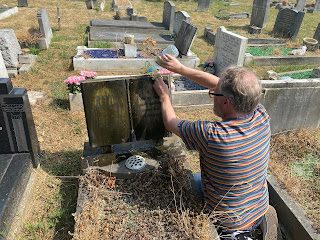 |
| Cleaning |
 |
| David Whitaker's grave |
 |
| Verity Lambert's blue plaque |
Doctor Who: Season 2 Blu-ray
"a deep dive into the life and career of story editor David Whitaker in LOOKING FOR DAVID."
Wednesday, August 10, 2022
Doctor Who Magazine special edition - Guest Stars
- Jean Marsh (Sara Kingdom, The Daleks’ Master Plan)
- Mary Peach (Astrid Ferrier, The Enemy of the World)
- David Troughton (King Peladon, The Curse of Peladon)
- Peter Miles (Nyder, Genesis of the Daleks)
- Simon Rouse (Hindle, Kinda)
- Pauline Collins (Queen Victoria, Tooth and Claw)
- Georgia Moffett (Jenny, The Doctor’s Daughter)
- Faye Marsay (Shona, Last Christmas)
Saturday, July 30, 2022
The Day No One Woke Up, by Polly Ho-Yen
As with Boy in the Tower, this is John Wyndham for kids. We start in grounded reality and very relatable problems, and then the weirdness slowly creeps in, ever more unsettling. That means the more outlandish, sci-fi bits of the plot feel solid and real; they are earned. Without spoiling the central wheeze, it's a fun reversal - things being done to humans that humans to do others.
The conclusion satisfying ties up all the mysteries but leaves a couple of questions - what might the children remember of all they've been through, and what is the fate of the character-I-won't-spoil they encounter? A brilliant book, one that linger longer in the memory...
Saturday, July 23, 2022
Penelope Fitzgerald - A Life, by Hermione Lee
"Dillwyn had his fiftieth birthday party at the Spread Eagle Inn at Thame, a chaotic event at which the notoriously grandiose and eccentric landlord locked up all the lavatories, so that the guests had to pee in the gardens, pursued by ferocious bees, and the only food provided was a dish of boiled potatoes. (This story may have grown in Penelope's telling of it over the years.)" (p. 40)
This Dillwyn, Fitzgerald's uncle, is the Dilys Knox whose work on codebreaking at Bletchley during the war I also ready knew about. His brother Ronald is the Ronald Knox whose writings on Sherlock Holmes I've noted in the Lancet. Their brother Evoe Know, editor of Punch, was also a name I'd seen before, but I'd never made the connection between these Knox brothers, or that Fitzgerald was Evoe's daughter. The book is full of such connections - Fitzgerald's children friends with the young Ralph and Joseph Fiennes, Fitzgerald's family close to that of EH Shepard, illustrator of Winnie the Pooh.
By chance, I went to see Daleks: Invasion Earth 2150 AD at the cinema about the same time as reading the section about Grace, the canal boat on which Fitzgerald lived in the early 1960s, and on which she based her novel Offshore. Lee tells us (p. 144) that Grace was moored opposite St Mary's Church, Battersea - which is where Peter Cushing is standing when he sees a Dalek emerge from the Thames. So the background of those shots is what inspired a Booker prize-winning novel. I initially hoped that perhaps Grace was one of the bleak-looking boats visible in the film, but Fitzgerald's modest home sadly sank in 1963, taking with it many of her prize possessions just when she had so little left to lose.
(There's another Doctor Who connection: in about 1969, Fitzgerald owned an "old 1950s car" called Bessie (p. 219), just as Jon Pertwee's Third Doctor was first motoring about in his vintage-looking kit car of the same name.)
Lee tells us when she doesn't know something, or at least can't be sure. And she's brilliant at using Fitzgerald's fiction to tease out details of the author's real life - not that anything in a novel must be based on real experience, but that the narrative is revealing of a state of mind. At one point, Lee cites the owner of the shop on which The Bookshop was based, writing to Fitzgerald in praise of the novel but underlining differences between fact and fiction (real life was, apparently, more benign). Elsewhere, we close in on a man who may be the older, married colleague we know broke Fitzgerald's heart. Lee names her suspect, and presents a good case for him being the one, then admits there's not really enough here but tantalising fragments.
There is still plenty that's unknowable - and, as Lee admits at the end, plenty that Fitzgerald kept to herself to the end. But there's a vivid portrait here, a sense of Fitzgerald as a real, complex and contradictory person. I feel I know Penelope Fitzgerald now: the person, the work, the extraordinary, often difficult life. This is more than portraiture: it is vivid history; it is animation.
I'm keen to read Fitzgerald's own work of biography, The Knox Brothers, about her father and his brothers. And I'm keen to read Human Voices, a novel based on her own experience working at the BBC during the war. And Hermione Lee's Body Parts: Essays on Life Writing looks very good, too.
Thursday, July 21, 2022
Doctor Who Magazine #580
The new issue of Doctor Who Magazine boasts a cover by Anthony Lamb showing the Daleks as they blaze into action. There's lots of coverage of the two Dalek movies from the 1960s - and of the never-made third movie, too. In "Mine Craft", me, Rhys Williams and Gavin Rymill detail - and reconstruct - the sets from the second Dalek movie.
(An odd thing to study the movie in such depth, and then go and see it on the big screen at Home in Manchester. I saw all sorts of details I'd never seen before, such as the glistening lava on the exploded Dalek castle at the end...)
There's also another "Sufficient Data" by me and Ben Morris, this time on distances Doctor Who has fallen.
Wednesday, July 20, 2022
Blake's 7: No Name
It's the first time I've written for Blake's 7 since Remnants, which came out what now feels like a lifetime ago in 2015, though I did also script edit The Offer by Peter Anghelides, in last year's The Terra Nostra set. Thanks to Peter for asking me back.
Saturday, July 16, 2022
Drunk on All Your Strange New Words, by Eddie Robson
This is a typically imaginative, clever and often funny novel by my mate Eddie Robson. It rattles along but the settings, characters and big ideas all really stick in the mind. Amy Scanlon reads the audiobook version very well - there are a lot of characters and accents, but she makes individuals distinct so we know exactly who is speaking when there is dialogue. A real pleasure of a novel.
I've been puzzling over what it reminded me of. Lydia is, I think, the latest in a line of klutzy, plucky young women Eddie tells stories about. In fact, the first chapter put me in mind of the relationship between Katrina and the alien Uljabaan in Eddie's sci-fi sitcom Welcome to Our Village, Please Invade Carefully. And that, in turn, had something of the feel of Paul Cornell's Happy Endings, in which all sorts of aliens descend on a village to attend the wedding of plucky, klutzy Bernice Summerfield - another young woman in a complex relationship with an alien being.
Lydia isn't Bernice and Fitz isn't Dr. Who, but there's an echo of the New Adventures Doctor Who books here - that mix of boggling sci-fi concepts with the ordinary domestic, the wit of it, the boozing (even if it's not exactly boozing). The result is at once dizzyingly original and comfortingly familiar. Loved it.











.jpg)







